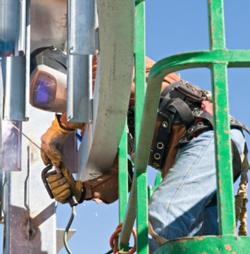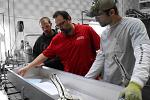- FMA
- The Fabricator
- FABTECH
- Canadian Metalworking
Categories
- Additive Manufacturing
- Aluminum Welding
- Arc Welding
- Assembly and Joining
- Automation and Robotics
- Bending and Forming
- Consumables
- Cutting and Weld Prep
- Electric Vehicles
- En Español
- Finishing
- Hydroforming
- Laser Cutting
- Laser Welding
- Machining
- Manufacturing Software
- Materials Handling
- Metals/Materials
- Oxyfuel Cutting
- Plasma Cutting
- Power Tools
- Punching and Other Holemaking
- Roll Forming
- Safety
- Sawing
- Shearing
- Shop Management
- Testing and Measuring
- Tube and Pipe Fabrication
- Tube and Pipe Production
- Waterjet Cutting
Industry Directory
Webcasts
Podcasts
FAB 40
Advertise
Subscribe
Account Login
Search
Welders on welding
How they feel about their jobs
- By Vicki Bell
- February 23, 2010
- Article
- Shop Management
Welding ranked No. 5 on CareerCast.com's worst jobs list. The company recently researched 200 different positions using five measurement criteria—stress, working environment, physical demands, income, and hiring outlook. According to the report generated by this research, the top 10 best jobs are:
- Actuary
- Software Engineer
- Computer Systems Analyst
- Biologist
- Historian
- Mathematician
- Paralegal Assistant
- Statistician
- Accountant
- Dental Hygienist
The bottom 10 are:
- Roustabout
- Lumberjack
- Ironworker
- Dairy Farmer
- Welder
- Garbage Collector
- Taxi Driver
- Construction Worker (Laborer)
- Meter Reader
- Mail Carrier
More than 20,000 subscribers to the "Welding Wire" e-newsletter learned about welding's placement on the list in the January 2010 issue, and many had plenty to say—both about welding as a profession and about the survey that determined its ranking.
If you are a welder, or if you are thinking about entering this profession, read on to find out what those who actually weld for a career think about their jobs.
'I Am Damn Proud of It'
The proprietor of a Wyoming shop wrote, "It seems the list of best jobs-worst jobs is inverted somehow. All the 'best jobs' are nonworking jobs, with the exception of the dental hygienist. The 'best jobs' are all paper-pushing, surplus labor jobs. Has our society fallen this far?
"Any of the so-called 'worst jobs' are ones I would like, including number five, welding, where I have been the past 25 years. After wasting time in college and five years in management trying to explain to brain-dead nonworkers how to pour piss out of a boot with directions on the heel, I gave up and went to welding school.
"My welding work speaks for itself. I do not need to shamelessly ingratiate myself to my boss or co-workers. I show up and do my job and do it very well, and am well rewarded for it. You can have your 'best jobs'; I'll stick with the 'worst jobs' and be very glad to be a welder.
"According to the American Welding Society, the average age of welders is my age, 57. Apparently our society has brainwashed all the young folks into thinking getting your hands dirty and having something to show for your day's labor at the end of the shift are somehow 'demeaning' or sinful. Well, so be it; I am glad I produce something real at the end of each day, and I am not one bit ashamed of it; in fact, I am damn proud of it."
'Only a Weirdo'
Think 25 years is a long time to weld? Welding instructor and author Carl Smith has twice as many years' experience and is still welding. Responding to the survey findings, Carl wrote, "It is said that only a weirdo would do a job that requires isolation behind a black screen and may cause burns over 60 percent of the body! That is a joke among welding professionals.
"Have you noticed the number of commercials on TV that show sparks flying from torches and grinders? I like the ones that show the guys welding on skyscrapers. It is obvious that most people know just enough about welding to see that it makes sparks.
"I am buried with requests for information about some form of welding. I receive e-mails and phone calls from all over the U.S. and even from the other continents. Most of the requests result from articles that I have written for thefabricator.com.
"There is definitely a shortage of welding knowledge and ability. I think there is a great need for all jobs found within the industry. If the public would do more research, I think welding would move up to the most desirable list. I have spent nearly 50 years in the industry and wouldn't trade it for any other."
'Career'
Gonzalo Huerta, former dean of instruction for renewable energy, Imperial Valley College, Imperial, Calif., has a slew of welding certifications, bachelor and master of science degrees, and decades in the welding industry. He said, "The list does say 'worst jobs. 'Welding has been good to me. It has allowed me to grow professionally; allowed me to develop and apply my creativity; and provided for my family.
"I'm glad I did not limit myself to a 'job' in welding, but rather developed and maintained my 'career' in welding—from welder, to college professor, to certified welding inspector, to college dean of instruction, to being retired, and, I might add, soon to work as a welding quality assurance consultant for the fabrication company of one of my former students from the 1970s.
"Again, all because I started in the No. 5 worst job to have!"
'No. 1 in My Book'
A welding shop owner from Texas said, "I guess you would have to be a welder to think you have a better-ranked job than this number shows. My mother taught me to weld; she built ships during World War II.
"I have been in all aspects of welding: barn-building stick to stainless steel TIG. Welding has supported me and my family all my life. I am proud to be a welder. I own a welding/fabrication company and employ about 20 men, some I taught, and we have fun doing it. I think my chosen profession is No. 1 in my book."
Brain and Brawn
It's not only welders who think welding is a good job. The purchasing agent for a manufacturing company in the Southeast has observed many welders on the job. She wrote, "The so-called 'best' jobs require that one sit around and use their brain. The so-called 'worst' jobs require that one use their brain and their brawn. The welders here seem to be satisfied with their job and enjoy their work."
What About the Pay?
Just as welding encompasses a wide spectrum of processes and environments, the profession commands a varied pay scale that depends on factors such as job location, what process is involved, how much skill is required, and how dangerous the job is.
One welder who is at the higher end of compensation wrote, "The 5th worst job? I made $189,000 this year doing something I love, in a relatively safe and clean environment. Zero lost-time accidents in 5+ years among three guys. I am a contractor for the Navy, and we do prototype weapons and weapons systems. I am well-respected and love my job. I cannot wait to get into work every day! Pressure? Sometimes. But I'm supporting our current and future troops. They are the ones having to deal with real pressure.
"Find me an insurance guy who thinks the same about his job."
This welder went on to say that he is addressing his earnings only because of the perception that welding is a low-paying job. The pay from his job combined with money he made in a side venture enabled him to start his own mobile welding business and pay cash for all the equipment.
Not all welders are as fortunate. Subscriber Ron Middaugh wrote, "I came out of the electronics industry originally. I did some welding so when my business wasn't doing what I needed, I took a job as a welder. In my limited experience of the weld industry, it appears to me to be very widespread in diversity. I'm not sure if running a robot that welds parts together and doing a little touchup where the robot might not be able to reach is in my opinion a skilled welder. There are many small shops that say they weld, but this has a very large gray area. These shops typically don't pay very well. What is deemed good or high pay for skilled labor? I have several friends that I feel are very good at their trade (welding), but they don't make much more than $20.00 per hour. They all have worked for medium-sized companies for 10-plus years. I am not impressed with these numbers, personally."
Middaugh cited a personal example of an underpaid welder. "I have a friend who has worked for a company for 20 years. In his first 10 years of employment, he received only three raises. Not enough to keep up with the standard of living increase. I tried to encourage him to find work elsewhere because other companies could see his skills and pay better. To no avail!"
Middaugh also raised questions, as did others, about the validity of the CareerCast.com survey findings. He questioned, "With these types of reports, who determines who gets asked about their skills and pay? Do you review the same number of companies—large, medium, and small mom-and-pop operations and average out what they pay skilled workers? Somehow, I doubt the reporting to be very legitimate in view of the large diversity in this industry."
A Balanced Perspective
A subscriber from Colorado shared his feelings about welding and job perceptions in general: "We can't fit everyone's norm of what is a good job and what is a bad job.
"Welding practices today trend more towards sophisticated procedures in clean environments. However, you can't avoid grime, grit, and uncomfortable positions when welding in a pipe trace or in a tight compartment inside a ship.
"Personally, I can't think of anything more stifling than sitting in front of a computer all day moving trains of numbers, however fascinating the statistics. I get a crick in my neck after four hours of keyboard.Some folks get more job satisfaction by joining two pieces of metal than studying the probability of mathematical models. I believe jobs on a scale of 1-10 are perceived as what is clean, safe, and pays the highest and not as the skills that it takes to complete a project. It takes skill and brainpower to wield a welding device as well as the scientist working with a probe".
About the Author

Vicki Bell
2135 Point Blvd
Elgin, IL 60123
815-227-8209
subscribe now

The Fabricator is North America's leading magazine for the metal forming and fabricating industry. The magazine delivers the news, technical articles, and case histories that enable fabricators to do their jobs more efficiently. The Fabricator has served the industry since 1970.
start your free subscription- Stay connected from anywhere

Easily access valuable industry resources now with full access to the digital edition of The Fabricator.

Easily access valuable industry resources now with full access to the digital edition of The Welder.

Easily access valuable industry resources now with full access to the digital edition of The Tube and Pipe Journal.
- Podcasting
- Podcast:
- The Fabricator Podcast
- Published:
- 04/16/2024
- Running Time:
- 63:29
In this episode of The Fabricator Podcast, Caleb Chamberlain, co-founder and CEO of OSH Cut, discusses his company’s...
- Industry Events
16th Annual Safety Conference
- April 30 - May 1, 2024
- Elgin,
Pipe and Tube Conference
- May 21 - 22, 2024
- Omaha, NE
World-Class Roll Forming Workshop
- June 5 - 6, 2024
- Louisville, KY
Advanced Laser Application Workshop
- June 25 - 27, 2024
- Novi, MI
































